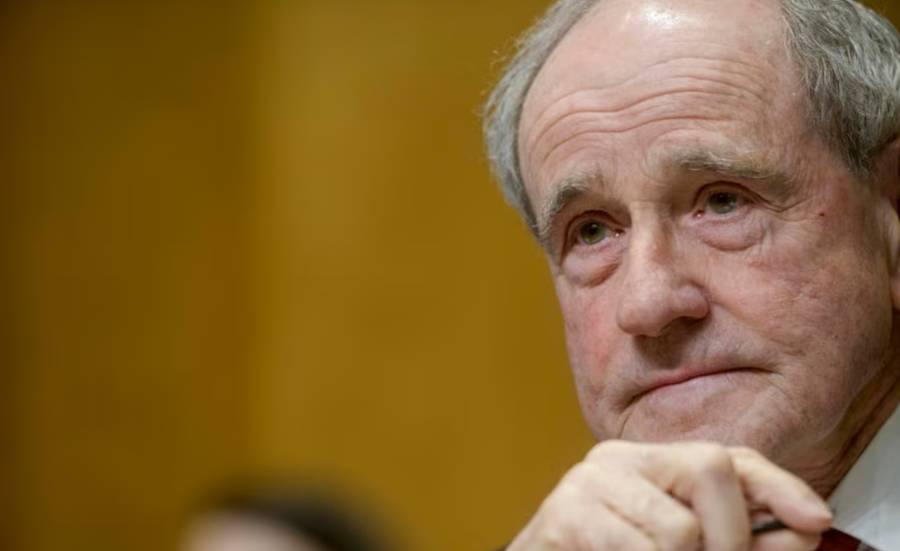
US lawmakers debated Thursday the implications of President Donald Trump's decision to freeze US aid to other countries for 90 days in competition with China. Mr. Trump signed an executive order hours after taking office to suspend all international aid from the United States while the new administration determines whether it is consistent with its "America First" policy.
Senate Foreign Relations Committee Chairman Jim Risch said the suspension was a necessary step to prioritize fiscal responsibility, as the US faces a debt of $36 trillion.
"It's definitely a process," said Senator Risch, a Republican from Idaho, on Thursday. "The action was meant to highlight the fact that every 100 days, the debt adds $1 trillion. If you think we're in a bad situation now, think about what's going to happen when those who gave us the debt come and ask for their money and we can't pay them. It's going to be a lot worse," he said.
"It has made us all reflect and look at how we are spending funds, where we are spending them, and how to do so in the most efficient way possible. It must be admitted that the decision has caused some concerns, but the administration will continue to work in this direction," added Senator Risch.
Democrats said the aid pause creates a gap that will be filled by the People's Republic of China (PRC).
"I am particularly concerned about the expansion of China's influence, both at home and abroad, as a result of freezing our aid to the outside world - and, in particular, the domino effect that this decision could have," said Democratic Senator Chris Coons of Delaware at a hearing on Chinese influence in the world.
"There is nothing China would like more than to limit the reach of our global influence, while increasing its own influence," Democrat Coons added. "[In this way] we are an unreliable partner to countries around the world and especially to developing countries, and my concern is that we are putting our security, our economic and diplomatic interests at risk by suddenly pausing, stopping action to counter malign activity from China as it advances its infrastructure investments."
But Senator Jeanne Shaheen of New Hampshire, the top Democrat on the Senate Foreign Relations Committee, said Democrats shouldn't be the only ones concerned about the aid assessment.
"I hope all of you on the other side will share your concerns with the administration and point out that this is not a partisan issue," she said. "We need to make sure that our influence continues around the world in the interest of our national security."
Around the world, U.S.-funded aid programs have already begun to wind down. The United States is the largest provider of aid to other countries, but in some areas China spends more.
According to the Office for Responsible Government, in the period 2013 - 2022, China spent $679 billion on global infrastructure projects compared to $76 billion in the United States.
"Foreign aid is one of the really important instruments of U.S. national security, alongside other tools like diplomacy, military aid and so on," Jennifer Lind, a professor at Dartmouth University, told lawmakers on Thursday.
"And in an ideal scenario, we would like to use all available tools in a coordinated manner to achieve our objectives. For that reason, I think it is understandable if the administration decides to take a brief pause to assess whether this assistance is being used appropriately."
But Melanie Hart of the Atlantic Council said the freeze is "hindering America's ability to compete with China in every area."
"Over $1 billion in more foreign military funding for Taiwan has been frozen. NDI (National Democratic Institute) and IRI (International Republican Institute) are closing global operations. Human rights organizations with funds frozen. Washington has effectively abandoned the Hong Kong pro-democracy movement," she said.
Ms. Hart added that she understands the administration's desire to increase the strategic focus of aid and appreciated the fact that the State Department unblocked some of the aid, but said that "this broad freeze hinders America at a time when we are in the battle of the century."
"It's a massive gift to Beijing. The longer it goes on, the harder it will be to regain the ground we are losing today, tomorrow and this week," Ms Hart said.
US Secretary of State Marco Rubio made some exceptions last Friday, unblocking emergency food aid, while earlier this week he made another exception for humanitarian aid.
The top Democrat on the House Select Committee on Strategic Competition with China welcomed Mr. Rubio's actions on Thursday, but said more needs to be done.
"Periodic review of the contribution of foreign aid programs to U.S. national security is necessary, but the sudden freeze of any foreign aid gives way to our main adversary: the Chinese Communist Party," said Illinois Democratic lawmaker Raja Krishnamoorthi in a statement.
"At a time when China is aggressively investing abroad, rerouting supply chains and buying favors from authoritarian leaders, the United States should be doubling down on foreign aid — not kneeling."/ VOA (A2 Televizion)











